Essential Tips for Socializing Young Alpacas
To socialize young alpacas, create a calm, quiet space where they feel safe with their herd and mother. Handle them gently and regularly to build trust and reduce anxiety, rewarding good behavior with treats. Introduce new sights, sounds, and other alpacas gradually to avoid stress. Encourage supervised play to develop social skills, and pay close attention to their body language to respond appropriately. Keep these basics in mind, and you’ll soon understand how to build confident, well-adjusted alpacas.
Key Takeaways
- Keep young alpacas with their mothers and herd mates to ensure security and proper social development.
- Handle young alpacas regularly using gentle methods and positive reinforcement like treats to build trust.
- Introduce new stimuli and alpacas gradually in controlled settings, monitoring stress and reactions closely.
- Use consistent commands and reward desired behaviors with preferred treats to strengthen bonds and encourage learning.
- Facilitate supervised group play and maintain familiar herd relationships to promote healthy social skills and reduce anxiety.
Creating a Calm and Safe Environment
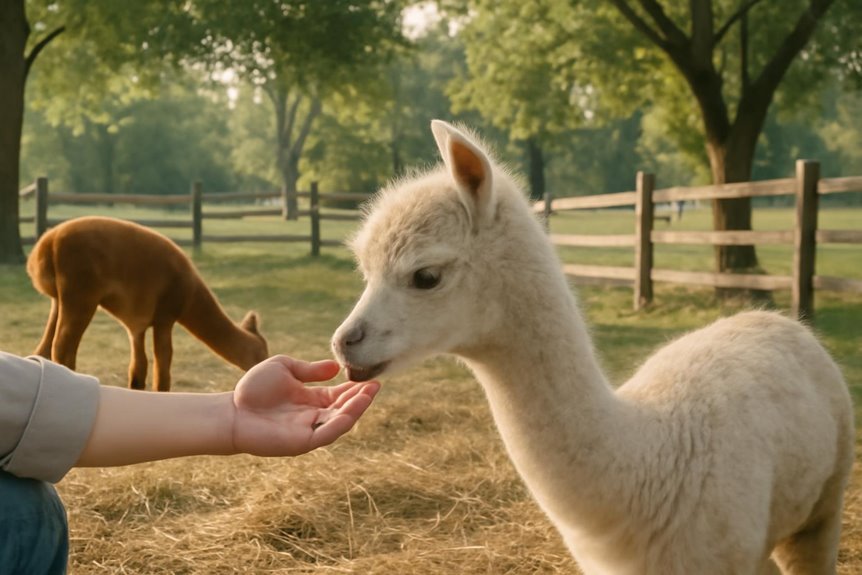
When you’re socializing young alpacas, it’s important to keep them with their mothers and herd mates to help them feel secure and reduce anxiety. Creating a calm and safe environment means providing a quiet, spacious area free from loud noises and sudden movements. This helps young alpacas stay relaxed and comfortable as they adjust to new experiences. Maintaining consistent feeding and care routines also builds their trust and confidence in their surroundings. When introducing gentle handling, use positive reinforcement like treats and soft encouragement to promote calm behavior and foster a positive association with human interaction. By focusing on these steps, you’ll support young alpacas’ emotional well-being and lay the foundation for successful socialization throughout their development.
Gradual Exposure to New Stimuli
Although introducing young alpacas to new stimuli can be challenging, doing so gradually helps them build confidence and reduces anxiety. Gradual exposure is key in their socialization, allowing them to adapt to new sounds, sights, and animals without feeling overwhelmed. You should introduce these stimuli in short, consistent sessions within controlled settings to encourage positive associations. Keep a close eye on your young alpacas’ reactions—if they show fear or distress, slow down the process. This careful approach not only minimizes stress but also strengthens their ability to handle changes as they grow. By practicing gradual exposure, you’re setting the foundation for well-adjusted alpacas that respond calmly to their environment throughout life.
Using Positive Reinforcement Effectively
To socialize your young alpacas successfully, you’ll want to reward their desired behaviors consistently with treats and praise. Using the same commands and positive interactions helps them understand what you expect. This steady approach builds trust and encourages them to repeat good behaviors.
Reward Desired Behaviors
Encourage your young alpacas by using positive reinforcement techniques like hand-feeding treats such as pellets or carrots, which helps build trust and creates a positive link between good behavior and human interaction. To effectively reward desired behaviors, observe each alpaca’s preferences for treats or praise, tailoring your approach to what motivates them most. When training new alpacas, use consistent cues to help them associate specific actions with rewards, accelerating their learning. Start with simple commands and gradually increase task difficulty, rewarding successes to keep them engaged. This method not only reinforces good behavior but also strengthens your bond. By focusing on rewarding desired behaviors through positive reinforcement, you set the foundation for confident, well-socialized alpacas that respond enthusiastically to human interaction.
Consistent Positive Interactions
When you consistently use positive reinforcement like treats and gentle praise, young alpacas quickly learn to connect specific behaviors with rewards, making training more effective. This approach builds trust and improves communication, essential for successful socialization. To use positive reinforcement effectively, focus on:
- Using the same rewards, like pellets or carrots, for specific actions to help your alpaca associate behavior with positive outcomes.
- Incorporating calm, regular interactions with gentle praise to strengthen your bond and establish trust.
- Pairing verbal commands with rewards consistently to enhance communication and encourage responsive behavior.
Importance of Regular Handling
Although young alpacas naturally rely on their mothers and herd, regular handling plays an essential role in helping them build trust and reduce anxiety around people and other alpacas. By consistently interacting with your alpacas through gentle, positive experiences, you help them associate humans with safety and care. This regular handling is key to developing their social skills, ensuring they grow into healthy and happy animals. Early, consistent contact increases their comfort level, making them more willing to engage and behave well as they mature. While they should stay close to their mothers initially, establishing a routine of handling sets the foundation for trust and reduces potential behavioral issues. Your commitment to regular, thoughtful interactions fosters a confident, well-adjusted alpaca.
Encouraging Play and Interaction With Other Alpacas
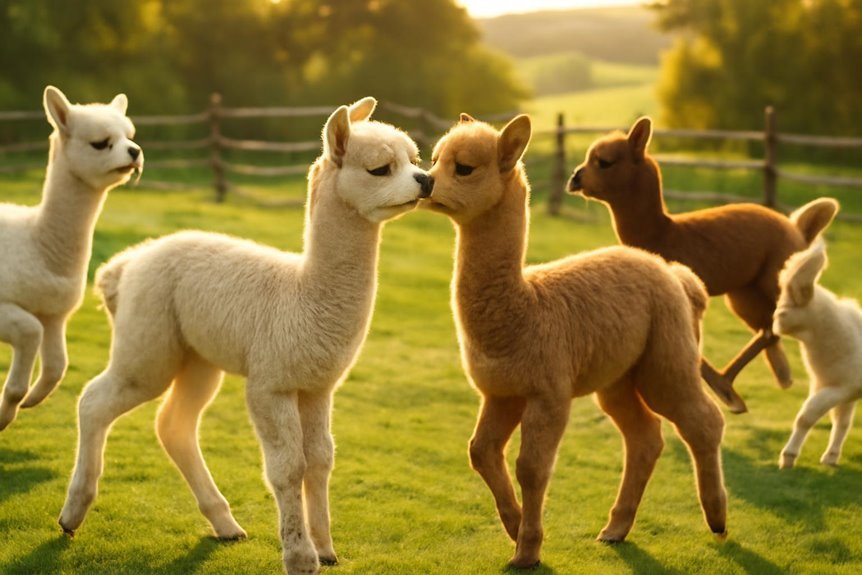
You’ll want to encourage group play to help your young alpacas build social skills and confidence. Keep a close eye on their interactions to guarantee everyone is comfortable and safe. This way, they can form healthy bonds while learning their place in the herd.
Facilitating Group Play
Since young alpacas learn best through interaction, facilitating supervised group play is key to helping them develop essential social skills. You’ll want to create opportunities where young alpacas can safely engage and bond with their herd mates. Here are three ways to encourage effective group play:
- Introduce new alpacas gradually to minimize aggression and guarantee smooth social integration.
- Use structured activities like obstacle courses or gentle chase games to stimulate playful behavior and communication.
- Provide consistent supervision to support healthy social hierarchies and step in if conflicts arise.
Monitoring Social Interactions
When young alpacas play together under supervision, they develop essential social skills and learn their place in the herd hierarchy. Monitoring interactions is an important part of this process, especially since alpacas are herd animals that rely on clear social bonds. By closely observing their play, you can quickly spot any signs of aggression or bullying and intervene to maintain a positive environment. Gradual introductions to new alpacas help reduce stress and encourage smoother integration, fostering stronger relationships within the group. Encouraging structured play activities not only promotes communication but also strengthens bonds among the young alpacas. Regularly monitoring social dynamics allows you to understand each alpaca’s personality, helping tailor socialization strategies that support their growth and overall herd cohesion.
Building Trust Through Consistent Presence
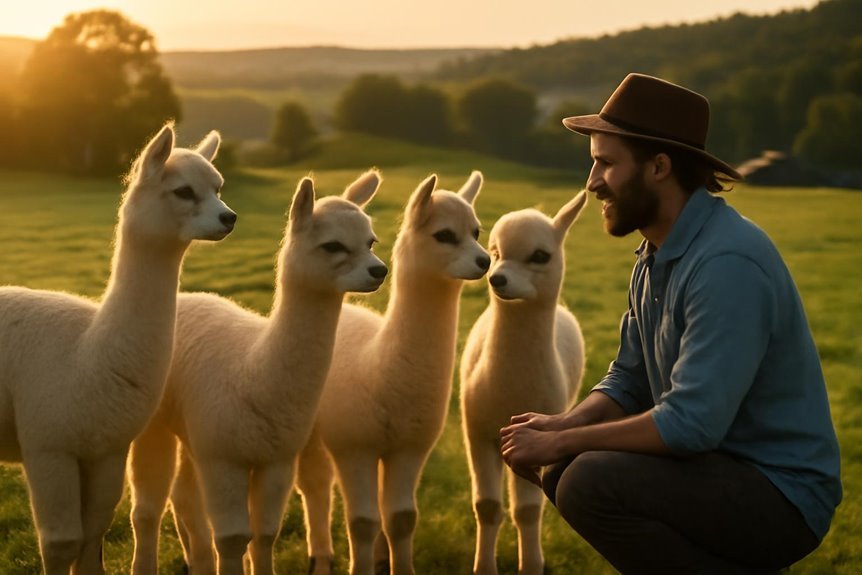
Spending twice as much time calmly present with young alpacas as you do handling unpleasant tasks helps them learn that your presence means safety and comfort. Building trust hinges on your consistent presence and respecting their personal space, allowing them to feel secure without pressure.
To strengthen this bond, focus on:
- Offering treats like pellets or carrots during calm moments to create positive associations.
- Maintaining gentle eye contact and speaking with warmth to help them feel valued.
- Letting alpacas approach you at their own pace, avoiding sudden movements or forced interactions.
Recognizing and Responding to Alpaca Body Language
Understanding alpaca body language is essential for effective socializing, as it lets you recognize their comfort levels and emotional states. These intelligent animals communicate through subtle cues like ear position, posture, and movement. For example, relaxed ears and slow movements show calmness, while pinned ears and tense stances indicate stress or aggression. Within the alpaca herd, dominant individuals stand tall with raised heads, while submissive ones lower heads and avoid eye contact. Spitting is another clear sign of displeasure or dominance assertion. By observing how a young alpaca interacts—whether it’s grooming, playing, or pacing—you’ll gauge its social comfort and status. Paying close attention to these signals enables you to respond appropriately, fostering trust and smoother integration into the herd.
Tips for Successful Early Socialization
Since early socialization shapes a young alpaca’s behavior and confidence, it’s essential to keep them with their mothers and herd mates during this period. As an alpaca owner, you’ll want to focus on fostering healthy relationships within the herd and reducing anxiety.
Here are three tips for successful early socialization:
- Maintain close contact with the mother and herd to build security and prevent behavioral issues caused by early separation.
- Introduce new alpacas gradually through supervised group outings to encourage effective communication and reduce stress.
- Engage in consistent, positive human interaction and gentle training to establish trust and comfort from an early age.
Frequently Asked Questions
How to Socialize Alpacas?
To socialize alpacas, you’ll want to observe their behavioral cues closely, use gentle grooming techniques to build trust, and align feeding habits within groups so they bond naturally, reducing stress and encouraging positive interactions.
What Not to Do Around Alpacas?
Don’t throw a wrench in the works by ignoring alpaca body language. You shouldn’t make sudden movements or loud noises, or you’ll scare them off. Respect their space and keep interactions calm to build trust.
How to Become Friends With an Alpaca?
To become friends with an alpaca, you’ll want to understand alpaca body language, use gentle feeding techniques with treats, and practice calm grooming practices. This builds trust and shows you’re a caring companion they can rely on.
How to Introduce New Alpacas?
Think of introducing new herd members like welcoming guests to a quiet garden party—you’ll want gradual acclimation, careful behavioral observations, and gentle guidance to guarantee harmony blossoms without stepping on any social toes.

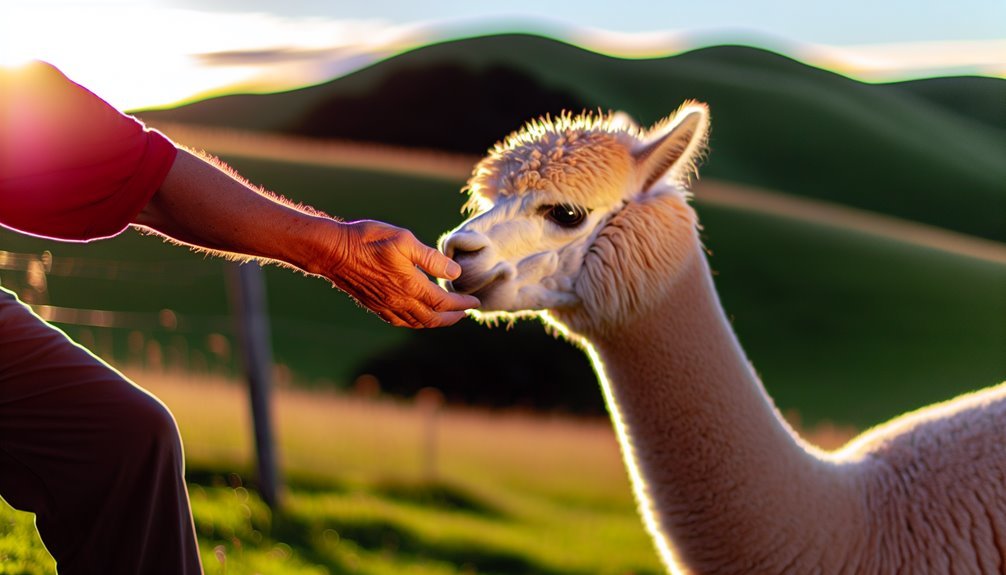



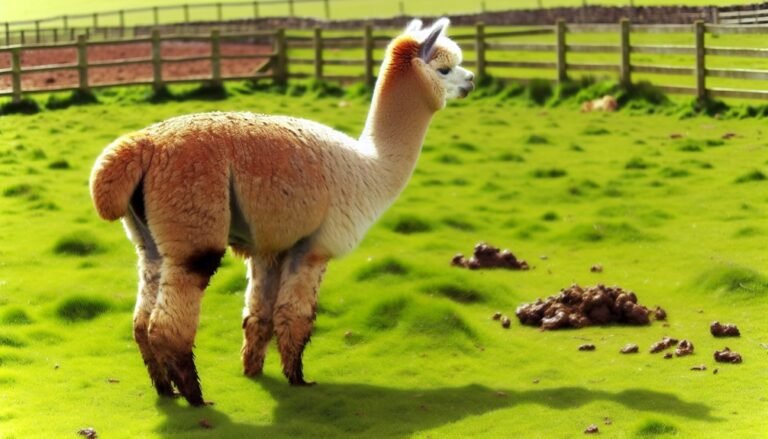
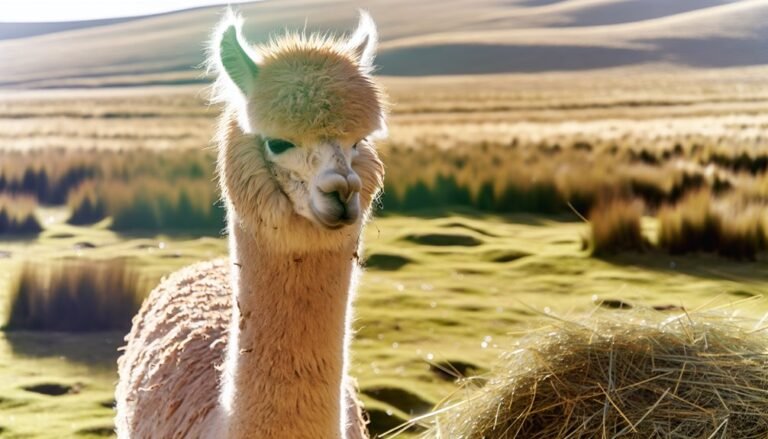

Our picks
Alpaca & Wool Felted Sole Inserts: Comfy Upgrade?
Best Alpaca Socks for Hiking: Ultimate Comfort and Durability on Trails
Best Alpaca Halter for Comfort and Control